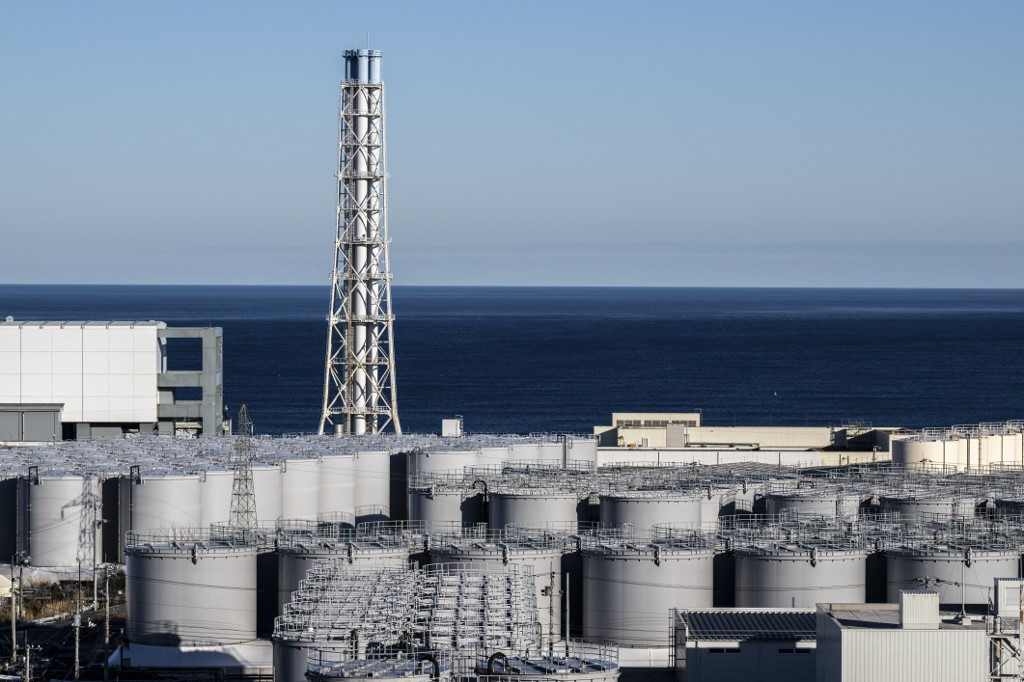Popular Reads
Top Results
Can't find what you're looking for?
View all search resultsPopular Reads
Top Results
Can't find what you're looking for?
View all search resultsConcerns linger over Fukushima wastewater discharge despite green lights
Indonesian fisheries association argues that the wastewater still contains radioactive materials higher than the safety threshold set by the government, despite treatment.
Change text size
Gift Premium Articles
to Anyone
E
nvironment and health concerns remain regarding Japan’s plan to release treated radioactive water from the tsunami-wrecked Fukushima power plant into the ocean, despite reassurances from the United Nations nuclear watchdog and scientists.
The Japanese government is planning to start releasing the treated wastewater as early as August, following a green light for the plan from the International Atomic Energy Agency (IAEA), Nikkei has reported. The plan to discharge the wastewater into the sea would have a negligible impact on humanity and the environment, said IAEA Director General Rafael Mariano Gross on Tuesday during his visit to Japan. Gross also presented the agency’s safety review to Japanese Prime Minister Fumio Kishida in Tokyo.
The plan still needs official approval from the national nuclear regulatory body, which is expected on Friday, Reuters reported.
But Indonesian fisheries professionals were still concerned that the discharged wastewater might still contain significant amounts of radioactive elements, or radionuclides, far above safety threshold for marine animals and humans.
The radionuclides, such as Hydrogen-3 and Cesium-137, are known to pose a threat to sea animals and humans if exposed to large amounts. Scientists believe some of the materials already have reduced radioactivity, as 12 years have passed since the Fukushima incident, and they have relatively short half-lives, or the time needed for the radioactivity to decrease by half.
But other materials take longer to decay, like Cesium-137, whose physical half-life is around 30 years. Indonesian Aquaculture Society (MAI), a fisheries association, believes that cesium-137 with a concentration of 18,000 becquerels (Bq) per kilogram will be released with the wastewater. The association cited data released in 2013 by the Tokyo Electric Power Company (TEPCO), which operates the power plant.
The figure is higher than the radiocesium threshold of 100 Bq/kg set by the Japanese government for intake of general food. “This nuclear wastewater will harm marine ecosystems, kill fish and other marine animals,” said MAI chairman Rokhmin Dahuri in a statement on Friday.
Humans would eat fish that have ingested the radionuclides, as the ocean current would carry the substance. It would later accumulate in the human body and cause diseases, he added.
Rokhmin’s concerns echoed objections from several countries, including China, which said that Japan would still harm the environment despite its responsibility under international law to protect the marine ecosystem. “If Japan insists on going ahead with the plan, it will have to bear all the consequences,” a Chinese Foreign Ministry spokesperson said in a statement on Tuesday.
The spokesperson also regretted the release of the safety report, arguing that the report failed to fully reflect the views of experts’ who participated in the study.
South Korea had also expressed their concerns over Japan’s plan. But the country respected IAEA findings since it was an internationally recognized organization, Reuters reported. Seoul would give its assessment of IAEA’s examination of Japan’s wastewater discharge plan when it announces its own review, said Park Ku-yeon, a vice ministerial official at South Korea’s Office for Government Policy Coordination.
The Philippines has also urged Japan to reconsider the plan and look for other solutions.
Japan has dismissed the concerns, saying that the water has been filtered to remove most radionuclides except for Hydrogen-3, which is difficult to separate from water. The treated water will be diluted well below internationally approved levels of tritium before being released into the Pacific.
Djarot Sulistio Wisnubroto, nuclear researcher from the National Research and Innovation Institute (BRIN), said the wastewater discharge likely would not have a significant impact to Indonesia. Before being released into the sea, the wastewater would be treated using a method called the Advanced Liquid Processing System (APLS), which filters out up to 62 kinds of radionuclides.
The APLS method, however, cannot filter out Carbon-14, which will have been diluted by the time it reaches the ocean, and Hydrogen-3. But even if fish ingest the radioactive materials, they will likely be discharged through natural biological processes, Djarot argued.
“Our research and latest simulations show the impact on Indonesia is nonexistent,” he added.
Japan's foreign minister Yoshimasa Hayashi is preparing to meet his Chinese and South Korean counterparts mid-July on the sidelines of a Southeast Asia group summit, the Yomiuri newspaper reported on Wednesday.
Prime Minister Kishida said on Tuesday his country would aim to gain acceptance both domestically and internationally with the IAEA's endorsement.










